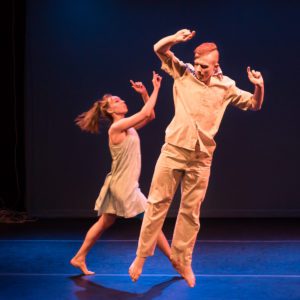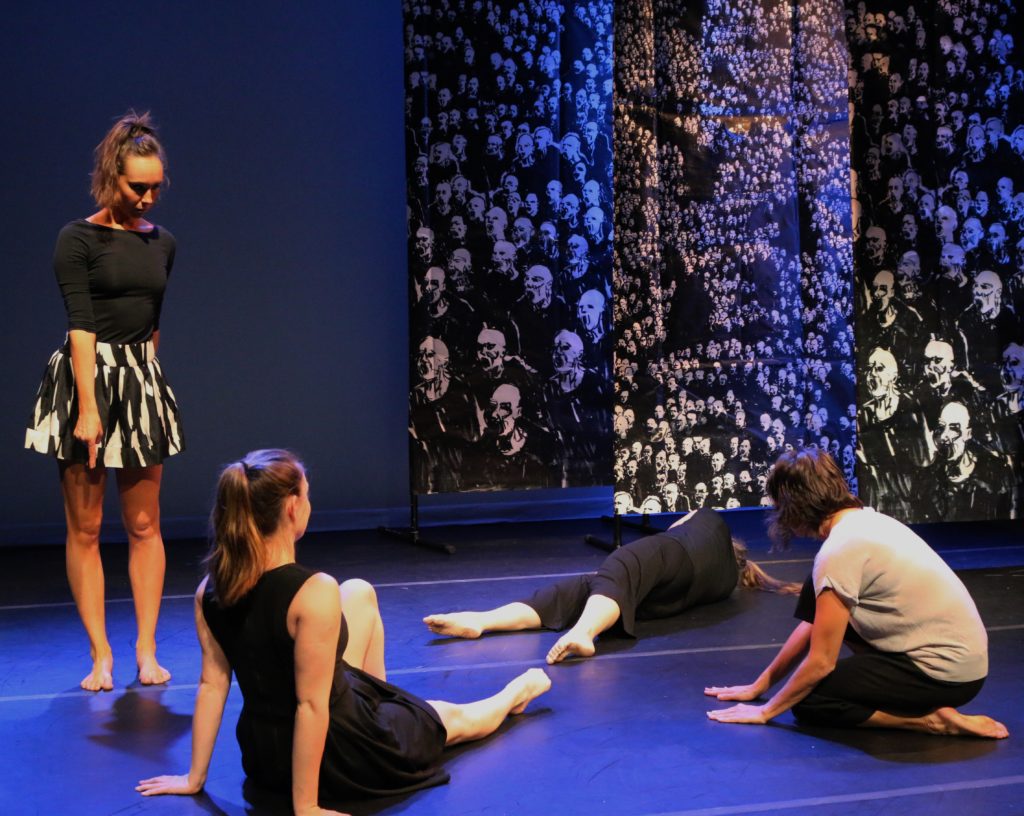
“Aflight.” Photo by Gail Bingham. Courtesy Jane Franklin Dance.
If you’re remotely concerned with or a part of the performing arts community — artist, donor, audience member, performer, board member — in Washington, D.C., or elsewhere, there’s a constant buzz and debate going on at every level.
What’s so important about live performance?
What is so important about plays and musicals? About orchestral music, about opera, about the cello in a string quartet or the piano in a jazz trio? What is so important about poetry boldly stated, sung, performed out loud in front of people? About a male or female dancer slicing through space in a ballet or a contemporary work? What is new and what is not and why does it matter?
Why — a deft digital but cultured type might ask — should we even care? All culture, all performance is available on a phone, through an app. All the songs, symphonies, plays, shows in the world are at our fingertips.
My answer has always been pretty simple: without live performance you have no immediacy, no boon companions in the audience, no connection to the performance and performers. You have instead borders, screens and smallness.
There is no app for what live performance can do, no sense of what time does to art and performance, how it transforms them into memory.
There is no app for that.
To get a real sense of just what that means, even in this technological age, go to one of the more than a hundred offerings at the Capital Fringe Festival, July 6 through July 30, an extravaganza of off-the-beaten-path performances large and small.
Since 2005, through rough times, physical moves and many changes, the festival — under founder Julianne Brienza — has been offering Washington performing arts buffs the essence of what live performance is and can accomplish.
The fringe concept goes back to 1947 in Edinburgh, Scotland, but it still seems like something brand new, sprung out of a roadside. All the theatrical tools — the words, makeup, costumes, props, instruments, voices, choreography, improvisation — come into play.
When everything else in the world seems mightily to try to separate us, here we are together, in a one-room office, in a theater, a nightclub, in the open air, under a tent, we happy few.
Over time, Capital Fringe has enriched itself through a kind of dispersion of category and genre: comedy, drama, dance, musical theater, music and physical theater. However, there is still plenty of overlapping, mixing and crossing over. This year’s festival, if you peruse the offerings, also seem a little more concentrated on regional and local groups and individual artists.
You just sort of go through and pick — because you like the sound of the group or are tickled by its name. Generationally, too, some things resonate more than others.
Here, without much ado and very little logic, are a few of my choices. The Capital Fringe website has complete information on dates, times, venues and ticketing.
“Arden Now,” a take on Shakespeare’s “As You Like It” by the Rude Mechanicals.
“Comedian Elected to Town Council in New Jersey,” just the title of which makes me laugh.
“Exit, Pursued by Bear,” from D.C.’s Barabbas Theater.
“Garbage Person Karaoke” (no further explanation forthcoming).
“Hexagon 2017: Let Freedom Zing,” for the Hexagonian in you.
“I’m Margaret Thatcher, I Is!” and “In the Company of de Sade,” not together, unfortunately.
“Nasty Women of the Ecstatic Rainbow Mystical Retreat,” which calls for some deconstruction, please.
“Wit and Wrath: The Life and Times of Dorothy Parker,” about the original intellectual mean girl from the Roaring Twenties, who supposedly said of Kate Hepburn that she ran the gamut of emotions from A to B.
“Clara Bow: Becoming ‘It,’” about Hollywood’s first sex symbol.
“Constructive Fictions,” a look at the case of Rabbi Barry Freundel, for Georgetown scandal fans.
“Howl: In the Time of the Trump,” putting a current-events spin on Beat poet Allen Ginsberg’s famed apocalyptic poem.
“Lazarus,” from Unstrung Harpist Productions.
“Nevertheless, She Persisted: Stories of Connections in a Disconnected Society,” from the SMArtsLab of Germantown, Maryland.
“Orson the Magnificent: The Magic of Orson Welles,” for those who regret never meeting the great iconoclast.
“Slaughterhouse Five,” for the Vonneguters.
“Thomas Jefferson Hoochie-Coochie Man,” a fictional monologue on TJ by BC (Bill Clinton).
“Help Me Wanda,” a celebration of Wanda Jackson by District Misfits.
“Think Before You Holla,” from Joe’s Movement Emporium.
“Aflight,” from Jane Franklin Dance.
Remember, for the moments brought to you by these artists (and others), there is no app.


